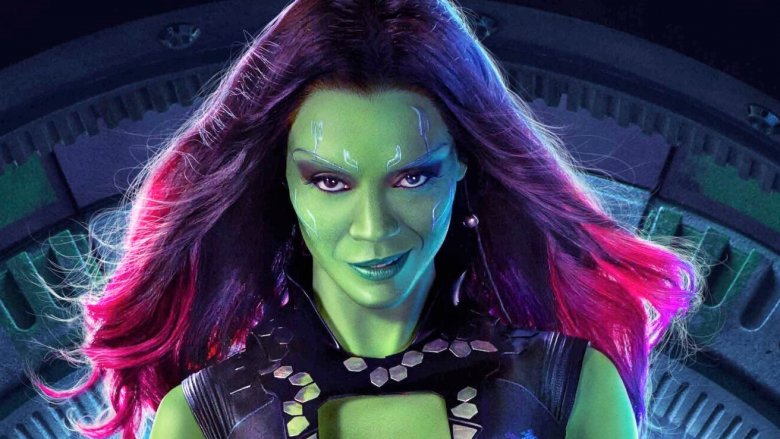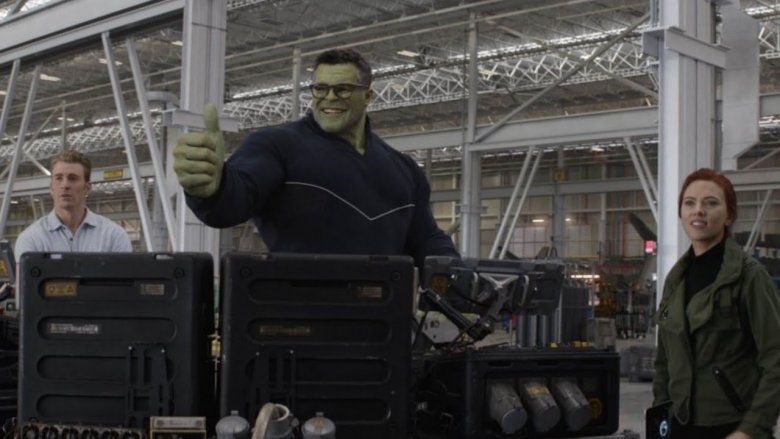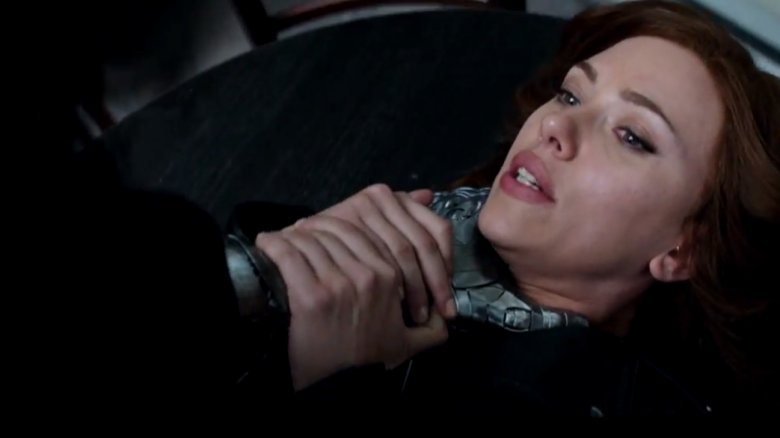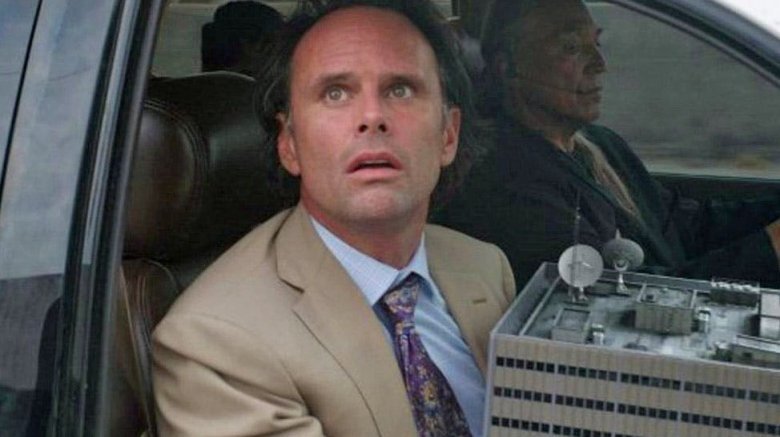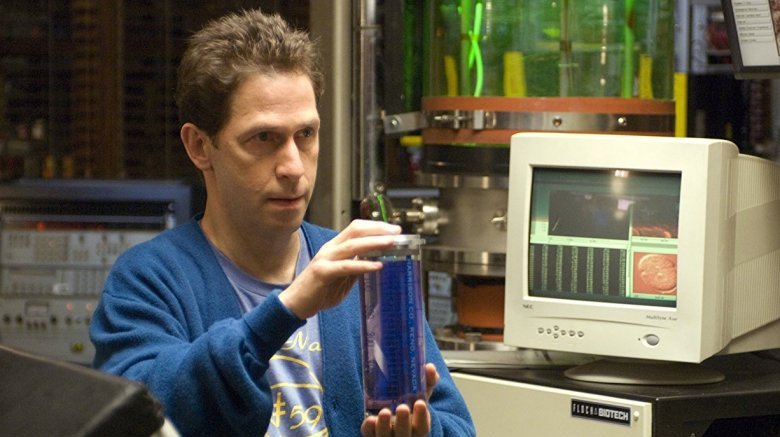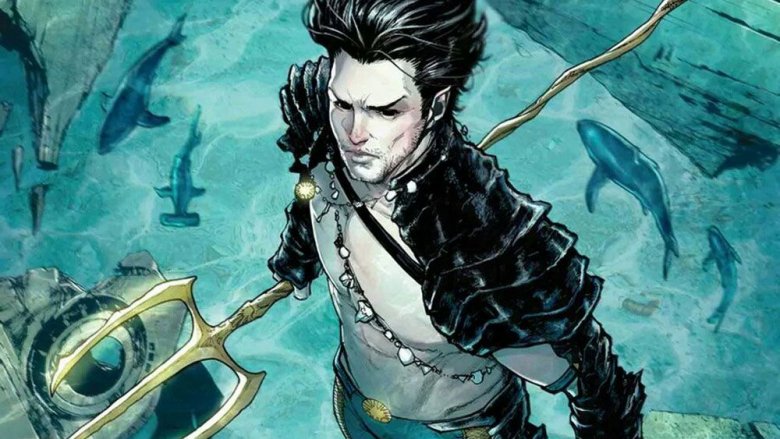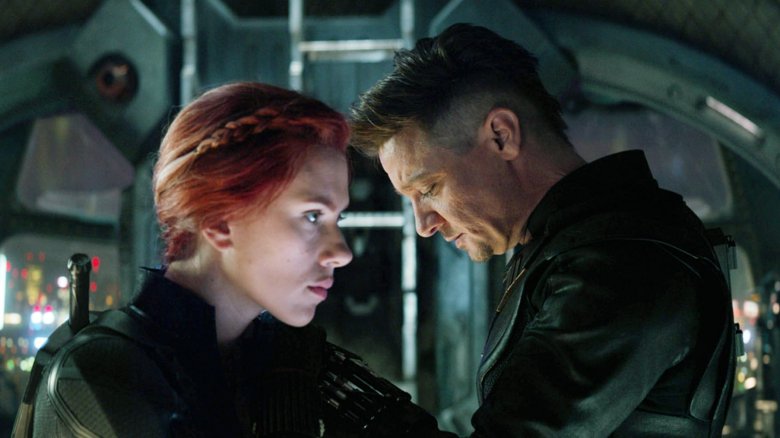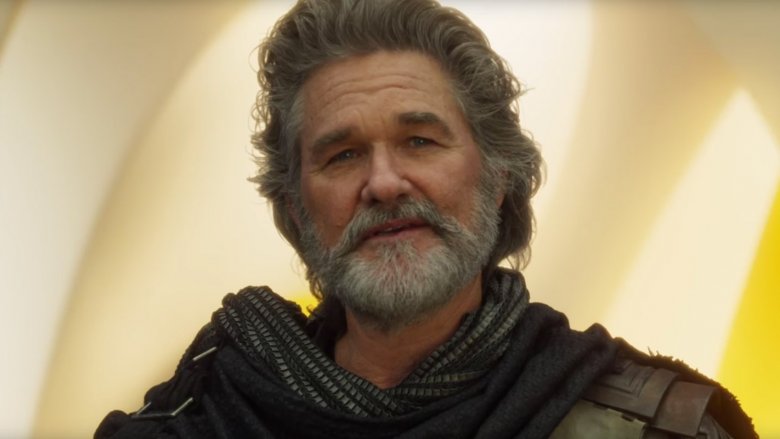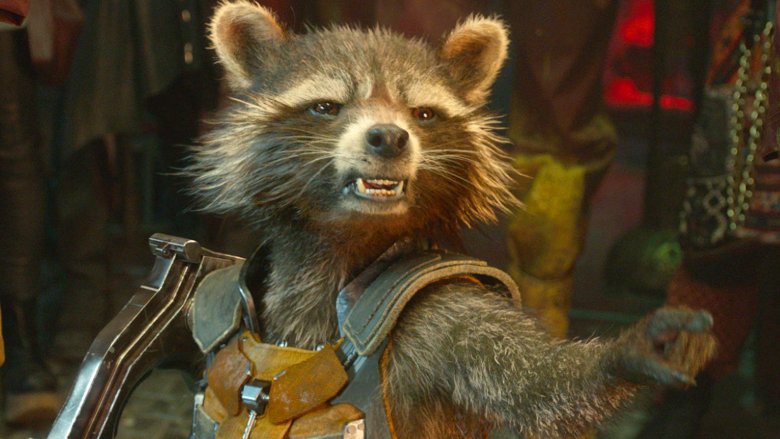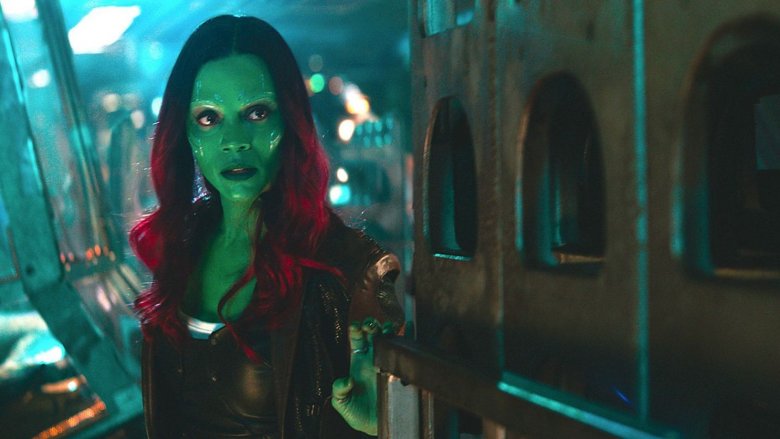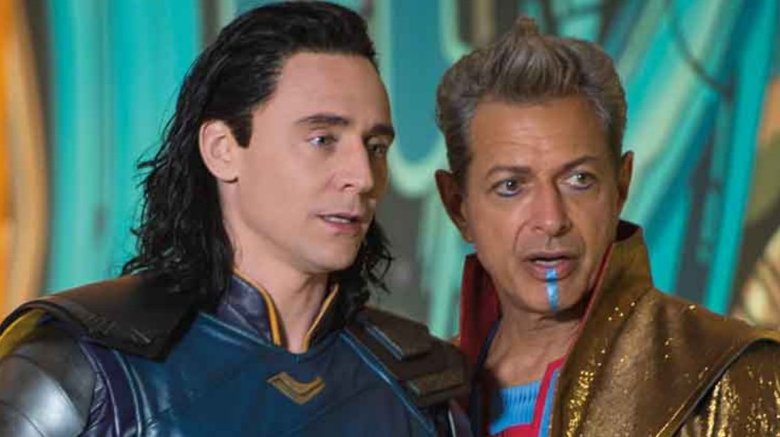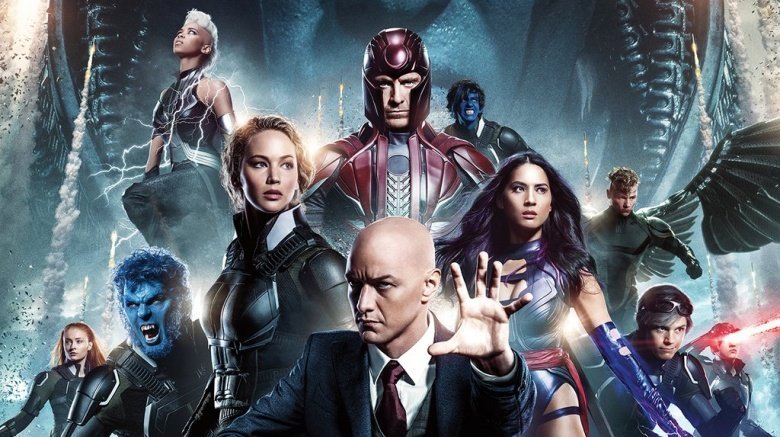What These Unsolved MCU Mysteries May Mean For Marvel's Future
One of Marvel Studios' hallmarks is its penchant for planting narrative seeds that take years to bear fruit. Thanos' mid-credits introduction in 2012's The Avengers is probably the most well-known example, considering it took six years for the Mad Titan to do get out of his chair and start whipping Avenger butt in 2018's Avengers: Infinity War.
While we've seen the rise and fall of Thanos, there are still plenty of unsolved mysteries left in the MCU, and some of them may never be solved. Some will be forgotten or neglected in favor of more prominent storylines, and some are just Easter eggs that were never meant to be taken seriously. But the problem is we won't know which is which until the truth for each mystery is revealed.
Some of those truths are bound to have a major impact on the Marvel Cinematic Universe, particularly with where the narrative finds itself post-Endgame. Tony Stark is gone, Steve Rogers is too old to dropkick bad guys, and the Hulk's right arm is scarred from his brief time with the Infinity Stones. Of the four heroes with solo films in Marvel's Phase 1, Thor is the only one who we know will be active in the near future. The landscape of the MCU is going to look much different than it did before Thanos' Decimation, and here are some of the biggest unsolved MCU mysteries that could shape Marvel's future.
An Endgame Easter egg and a troubling Marvel mystery
In August 2019, Reddit user kobikwahbz noticed something strange about the time machine in Endgame. He posted a screenshot from the scene when the 2014 version of Nebula activates the machine to bring Thanos to 2023. We see what appears to be a user history. Some of the times don't seem to match with years we see the heroes travel to, including the year 2988.
One theory is that this isn't a history screen, but instead shows dates the Avengers consider traveling to. The prologue of 2013's Thor: The Dark World — in which Thor's grandfather defeats the Dark Elves and seizes the Aether — takes place in 2988 B.C. The Avengers could have discussed going to that time, rather than 2013, to get the Aether.
Another possibility points to a future MCU big bad we've theorized could show up. Hulk is seen working the time machine more than anyone, and in the 1992 comic Incredible Hulk: Future Imperfect, the Hulk transforms into the Maestro — a despot who rules over a dystopian future. Was Hulk secretly taking trips into the future? If so, could he have less than heroic motives? We only have the Hulk's word that whatever experiments he conducted to create the Professor Hulk worked. Ask Emil Blonsky of The Incredible Hulk or Darren Cross of Ant-Man how experimenting on yourself affects your mind.
We might learn Bucky and Black Widow were lovers
A single line from 2016's Captain America: Civil War could have major consequences for the upcoming Black Widow film, the Falcon and the Winter Soldier Disney+ mini-series, or both.
After Zemo activates the Winter Soldier, all of the Avengers at the CIA base in Berlin try going one-on-one with Bucky, and almost all of them fail. When Bucky and Black Widow fight, Bucky grabs her throat and slams her onto a table, at which point Natasha whispers, "You could at least recognize me."
In the comics, Bucky and Black Widow not only knew each other while both were still assassins, they were lovers. In most likelihood, this line means that the same is true in the MCU. The only other time we've seen Natasha and Bucky interact is when they fought in Captain America: The Winter Soldier, and it doesn't seem likely Nat would care about him recognizing her from that.
We know that Widow said she has a dark past. From some of the things Loki says during their confrontation in Avengers, it seems likely part of that past includes the murder of innocent civilians (Loki mentions, among other things, a "hospital fire"). There's a big difference between knowing a character has a dark past and actually seeing it. If in Black Widow, Falcon and Winter Soldier, or another MCU vehicle we end up witnessing a bit of her backstory with Winter Soldier, it could change how we view her forever.
The next MCU big bad may have already made his move
Now that Thanos has died twice, we're understandably curious about who's going to step into the Mad Titan's shoes. With as many untapped villains as there are in the source material, there's no shortage of candidates. Doctor Doom is a popular pick. There's the world-eater Galactus and the time-traveling warlord Kang. Regardless of who it is, we may have already seen them at work. Kind of.
Ant-Man and the Wasp offers a comparatively lighthearted contrast to the grim ending of 2018's Avengers: Infinity War, so you couldn't be blamed for not looking as hard for narrative connections to the larger MCU. But one mystery the film leaves unsolved is exactly who Sonny Burch is working for. We know he has an employer, and we hear Burch talking to them on the phone, but we don't know who it is. All we know is that Sonny Burch does not want to disappoint them, which is already enough to suggest it's someone pretty powerful.
We know Burch's employer wants Henry Pym's technology involving the quantum realm which, among other things, leads to the Avengers figuring out time travel and saving Thanos' blipped victims. That doesn't sound like technology a guy like Daredevil's Wilson Fisk or even Spider-Man: Far From Home's Quentin Beck would have the clout to aim for. This is someone next level, and whoever it is could very well be the MCU's next big bad.
Could the next MCU big bad be the Leader?
Few Marvel flicks have as many unresolved threads as 2008's The Incredible Hulk. While General Ross returns to the MCU narrative as Secretary Ross and we hear about Emil Blonsky briefly from time to time, most of the film's major characters are M.I.A., including the guy who was set up to be the Hulk's arch-nemesis — Samuel Sterns, a.k.a. the Leader. The last time we see the eccentric scientist in The Incredible Hulk, he's on the floor of his lab. Bruce Banner's blood is dripping onto a cut on his head, and he smiles as his forehead begins to bubble beneath his skin.
In spite of the fact that another Hulk movie is unlikely, that doesn't mean Tim Blake Nelson couldn't return as the Leader. In a 2017 interview with Crave Online, when asked about the possibility of Nelson returning as the Leader, Marvel Studios President Kevin Feige said fans "would be surprised" with how many times the possibility has come up.
While Hulk fans would likely not be super happy to see the Hulk's arch-nemesis without a Hulk movie, it wouldn't be the first time Marvel has harvested Hulk characters for the rest of the MCU. Adrian Pasdar played the classic Hulk antagonist Glenn Talbot for five seasons of Agents of S.H.I.E.L.D., William Hurt has appeared as Secretary Ross in three other films, and Bruce's cousin, She-Hulk, is on her way to Disney+.
Namor might have already arrived
A rumor has been brewing ever since a brief Avengers: Endgame scene got fans wondering about what was happening under the sea. In 2023, when Black Widow is holding a meeting with the holographic projections of some of the other surviving Avengers, she questions Okoye about an underwater earthquake that was detected. Okoyoe brushes off Natasha's concerns, but the comment had fans wondering about the aquatic Marvel character Namor the Sub-Mariner. Once mostly considered a hero, Namor has taken more villainous turns in the comics over the years, and some of those darker moments had him going head-to-head with Black Panther. With that, and a casting call that got the rumors circulating even faster, there's a lot of speculation that Namor the Sub-Mariner will be the villain for Black Panther 2.
If the rumors prove true, we'll be witnessing a whole new corner of the Marvel Cinematic Universe. Rather than seeing another strange planet, we'll be seeing an apparently undiscovered underwater kingdom ruled by one of Marvel's most powerful mortals. Namor's been known to command gargantuan underwater monsters to attack what he calls the "surface world," which could be the source of the quake in Endgame. If his physical power is anything like what it is in the comics, T'Challa is in for the fight of his life. Namor's physical might — particularly when he's underwater — has been shown to rival that of Marvel's strongest heroes, not to mention the army of blue-skinned super strong warriors he'll have at his command.
The mystery of Budapest
It's perhaps not the most pressing MCU mystery for most fans, but we've had plenty of chances to wonder since 2012's Avengers, exactly what happened in Budapest?
We briefly see a shot of Black Widow and Hawkeye fighting side-by-side in Budapest on the S.H.I.E.L.D. Helicarrier in The Avengers. Later, when Nat compares fighting the invading Chitauri army in New York City with their experience in Budapest, Clint quips that she remembers Budapest much differently than he does. And when Black Widow and Hawkeye team up to get the Soul Stone in Avengers: Endgame, as the Guardians' ship starts speeding toward Vormir, Hawkeye comments how they're "a long way from Budapest," and sadly, it's one of the last conversations they have together.
So what exactly happened in Budapest, and why was it so memorable to be such a landmark in their friendship? Well, according to rumors we might actually find out. When Marvel showed footage from the production of Black Widow at July's San Diego Comic-Con, one of the clips reportedly opened with the title card "Budapest."
What would seeing Budapest mean for the future of the MCU? Well, it may have more to do with the past. We know that at some point Hawkeye was sent to take eliminate Black Widow, and he decided to do otherwise. Could Budapest be the place where their bond was forged?
Ego may mean more than we realized
There was plenty we didn't know about Kurt Russell's Ego by the end of Guardians of the Galaxy Vol. 2, but none of that seemed to matter quite so much until we finally knew for sure that Marvel Studios had plans to bring the Eternals to the big screen.
The Eternals of the comics were created by the Celestials — a group of enigmatic, massive, and insanely powerful beings who are architects of much of what can be found in Marvel's cosmos. Considering the concept art that's been released for The Eternals, it seems clear the Celestials will likewise be integral to the MCU adaptation. Now, the Ego of the comics has little connection with the Celestials, other than the fact he's also very large and is one of Marvel's cosmic characters. But this was changed in Guardians Vol. 2. Ego tells the Guardians that he's a Celestial, and that he came to the awareness he was alone, with no understanding of why he was alone or if there were others like him.
Well, yeah, there are others like him, and that leads to the question of what Ego's death means to The Eternals. Did the Celestials purposely exile Ego from their presence? If not, then what will happen if it's learned a small group of mortal troublemakers killed a Celestial? Could this put the Eternals and the Guardians on a collision course?
Rocket's mysterious origin could make or break the Guardians
It's somewhat ironic that the furry little curmudgeon who happens to be one of the most popular members of the Guardians of the Galaxy is arguably the one we know the least about, at least in terms of his origins.
Director James Gunn has confirmed he has an origin story to tell for Rocket and that it isn't quite the same as what we see in the comics. In the source material, Rocket is one of a number of altered animals that are made to be caretakers for a planet-sized lunatic asylum called Halfworld. Gunn has said the origin he has planned is actually more "horrible" than what the comics tell us, so it seems likely he'll stray from the Halfworld narrative.
Regardless of what origin Rocket has waiting for us, it's likely to shake the Guardians to their core, especially since we've heard nothing about how Rocket came to be Rocket, other than knowing he was the victim of a scientific experiment. The rude little trash panda who's rarely at a shortage for words has barely said anything where he comes from, which means whatever he's hiding is indeed horrible. He may not even want to be a part of the team anymore if the rest of his allies learn his secrets.
And as off-putting as he can be, Rocket is the backbone of the Guardians. Trouble for Rocket means trouble for everybody.
Gamora's location could point towards her future
Initially after the release of Avengers: Endgame, there was some question about whether or not Gamora survived. Since she came to 2023 as part of Thanos' forces, some wondered if Tony Stark's sacrificial snap was able to distinguish between her and Thanos' other servants. We know now that Gamora lived, so apparently the Stones knew who turned their back on Big Daddy Grimace and who didn't. Still, two questions remain. Where did she go, and why did she go there?
Wherever she's heading is likely to tell us a lot about what to expect from the warrior in Guardians of the Galaxy Vol. 3. We've made our own guesses about what we might expect from Gamora after Endgame, and one distinct possibility that's tough to get away from is that Gamora might not be all that much on the side of the angels anymore.
The Gamora who survives Endgame never tried to keep the Power Stone from Ronan the Accuser. She never worked with the Guardians (save for briefly fighting alongside Nebula in Endgame) and never fell in love with Peter Quill. That Gamora died on Vormir. This Gamora doesn't know that same road of redemption, and the possibility she might be a bad guy seems more likely, especially since Zoe Saldana has expressed interest in exploring the darker side of the green-skinned assassin.
Loki could have an interesting connection with the Elders
One mystery that has endured since the mid-credits scene of 2013's Thor: The Dark World is what connection, if any, there is between Loki, the Collector, and the Grandmaster.
In that scene, Loki (disguised as Odin) — who doesn't seem like the kind of guy to send powerful objects elsewhere — inexplicably sends Volstagg and Sif to Knowhere to give the Aether to the Collector. You might argue he does it because he doesn't want to attract Thanos' attention, but the Tesseract remains in Asgard, making sure that — until its destruction at the end of Thor: Ragnarok — Asgard would one day be Thanos' target.
The only obvious reason for Loki's actions is that he has some kind of connection with the Collector. This possibility seems more likely if you know that, in the comics, the Collector and Jeff Goldblum's Grandmaster are members of the same group, the Elders of the Universe. We never learn exactly how Loki manages to earn Grandmaster's favor in Ragnarok. They're simply friends while Thor is in chains. But if Loki is already in cahoots with the Collector, and if the Collector and Grandmaster know one another, a picture begins to form.
If the connection is real, it could mean big things for the MCU. In the comics, the Elders of the Universe are some of the most powerful and manipulative characters in the cosmos. When they're working together, it rarely means good things for anyone.
The introduction of mutants is bound to change Marvel's future
Now that Disney owns the film and TV rights to the Marvel characters once in Fox's stable, the X-Men are on their way. No one knows how the mutants will be introduced to the MCU, and the answer to that question is sure to radically change the MCU for one simple reason. Because mutants in the MCU, taken at face value, make no sense.
Now, hold up. We're not arguing mutants shouldn't be in the MCU. The problem is that the X-Men, as they've existed so far in the comics and other media, are defined by the fact that they're hated and feared by the same world they fight so hard to save.
Why would the world of the MCU fear and hate mutants? The people of the MCU have weathered alien assaults, sentient killer robots, and a purple guy snapping his fingers and killing half of everyone. They live in a world with Avengers, Inhumans, Runaways, and Norse gods. Why would anyone be specifically scared of mutants in that world? Why would they be any more scared of mutants than they would be of, say, the guy who controls weather with a hammer? Or the giant green dude who knocks down buildings?
We trust Marvel Studios will come up with something we can't foresee, but it's tough to imagine that whatever they think of won't change the very fabric of the MCU.
